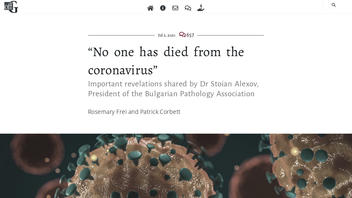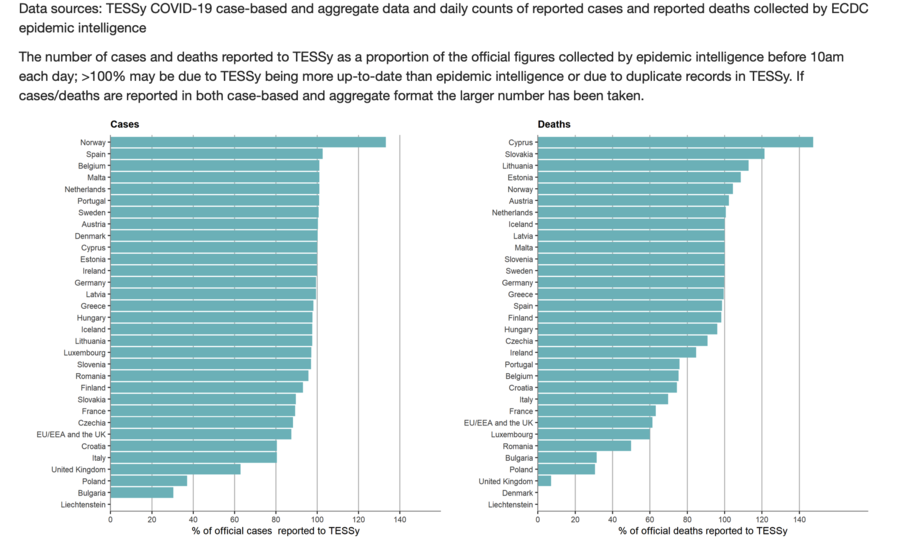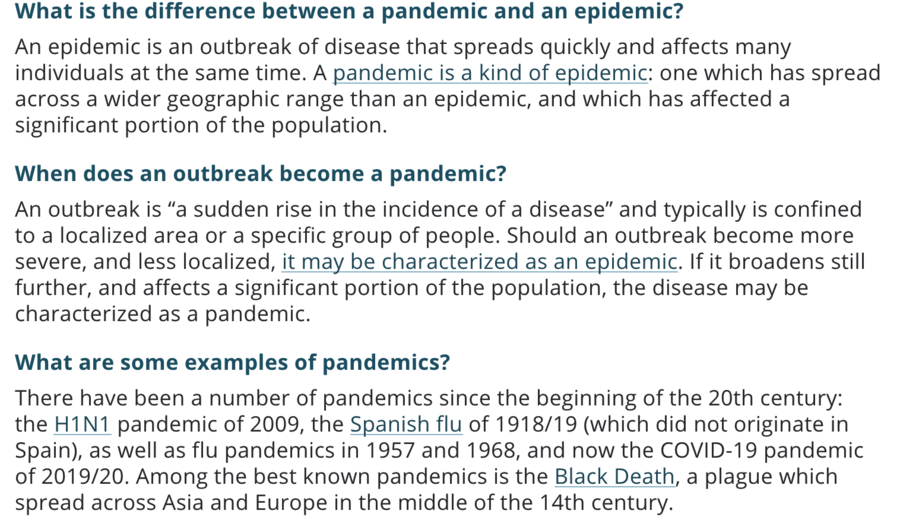
Is it true that nobody has actually died from COVID-19 across Europe, and that officials there have identified no antibodies specific to the disease? Also, is it true that there is no pandemic, but merely an "infection"? No, none of this is true, according to published research and the European equivalent of the U.S. Centers for Disease Control and Prevention.
The claims were made by a doctor in an article (archived here) published by OffGuardian on July 2, 2020, titled "'No one has died from the coronavirus,'" which opened:
A high-profile European pathologist is reporting that he and his colleagues across Europe have not found any evidence of any deaths from the novel coronavirus on that continent.
Dr. Stoian Alexov called the World Health Organization (WHO) a "criminal medical organization" for creating worldwide fear and chaos without providing objectively verifiable proof of a pandemic.
Another stunning revelation from Bulgarian Pathology Association (BPA) president Dr. Alexov is that he believes it's currently "impossible" to create a vaccine against the virus.
He also revealed that European pathologists haven't identified any antibodies that are specific for SARS-CoV-2.
These stunning statements raise major questions, including about officials' and scientists' claims regarding the many vaccines they're rushing into clinical trials around the world.
They also raise doubt about the veracity of claims of discovery of anti-novel-coronavirus antibodies (which are beginning to be used to treat patients).
Users on social media only saw this title, description and thumbnail:
"No one has died from the coronavirus"
Rosemary Frei and Patrick Corbett A high-profile European pathologist is reporting that he and his colleagues across Europe have not found any evidence of any deaths from the novel coronavirus on t...
Consider: Some 44,600 people have died from the disease caused by the novel coronavirus in the U.K. alone, and antibodies have been identified that are peculiar to COVID-19, also known as SARS-CoV-2, according to the European Centre for Disease Prevention and Control -- an agency of the European Union. Last, nearly every health organization in the world, including the World Health Organization, has declared or acknowledged a coronavirus pandemic.
According to the OffGuardian story:
Dr. Alexov made his jaw-dropping observations in a video interview summarizing the consensus of participants in a May 8, 2020, European Society of Pathology (ESP) webinar on COVID-19.
In essence, Alexov defines deaths from coronavirus very differently than the general global medical community, limiting coronavirus deaths only to those patients who develop and die from institial pneumonia. As Alexov -- quoted in one interview as saying people may "say I'm crazy" -- describes his definition:
"...people are dying with coronavirus, not from."
Below is a YouTube video of an interview with Alexov from May 12, and here is the English transcription of the interview, which was linked in the OffGuardian story. Although many claims are made in the story, based on the webinar and interview, Lead Stories has focused on the three chief claims here -- that no one has died from the coronavirus, and that no specific antibodies for SARS-CoV-2 have been identified, and that there is no pandemic:
In the transcription, there is this notable answer from Alexov, president of the Bulgarian Pathology Association, in an interview with Dr. Stoycho Katsarov, chair of the Centre of protection of citizens' rights. The interview purports to shed light on the consensus of pathology experts from EU during the European Society of Pathology's May 8 webinar, "COVID-19: Unprecedented Challenges in Pathology Departments Across Europe."
The good thing is that the webinar was organized by the European Society of Pathology, and in the webinar were multiple participants from Italy, Spain, Germany, Sweden. Many questions were asked. And the main question was, what is happening with the coronavirus infection - not pandemic. I want to accentuate that: it's an infection, not a pandemic. Because what we hear, many of the facts that are given, the main thing the people are really afraid of is to die, but we the pathologists, we meet with dead people all the time.
The main conclusion was that the autopsies that were conducted in Germany, Italy, Spain, France and Sweden do not conclude that the virus is deadly...
When we say that the patient died because of the coronavirus, we mean that the coronavirus led to interstitial pneumonia, afterwards leading to the death of the person, with no other diseases in other organs and in other systems. But such facts haven't been found; nobody has reported this.
And because of that, I'm really concerned with the inadequate behaviour of the World Health Organization. It's the first time in my practice -- I've been practising for 30 years as a doctor -- that the WHO is announcing a pandemic before it has facts to support this. They didn't not announce an epidemic but instead a pandemic. Pandemic means that people will die from the coronavirus. I don't know why many governments and country leaders are saying that people are going to die from it. While us pathologists we aren't scared by that because we meet with that every day -- we work with dead bodies.
What's unclear is why this story in OffGuardian -- which has been copied and reposted by other outlets -- came on July 2, two months after the webinar and the interview. Much has changed in the science of the novel coronavirus in terms of what has been found out about the virus and COVID-19, treatments and just about every other aspect.
In the interview, Alexov acknowledges that people may "say I'm crazy." The reason for that is death totals in European nations as of July 8 totaled 44,602 in the United Kingdom, according to the Johns Hopkins Coronavirus Resource Center that tracks confirmed COVID-19 cases and deaths attributed to the disease.
Italy had the second-highest European total with almost 35,000 deaths, followed by France at nearly 30,000 deaths and Spain at more than 28,000 deaths. The totals then dropped substantially, with Belgium nearing 10,000 deaths and Germany with just over 9,000 deaths. (The United States has the highest death toll globally, with nearly 132,000.)
Of course, some patients had pre-existing illnesses that contributed to their death, but COVID-19 was determined to be the cause, or contributing cause, of death in each case, according to Johns Hopkins.
The ECDC reports this on its site:
According to data from the ISARIC COVID-19 database, 18%of hospitalised patients (4 752) were admitted to an ICU or high dependency unit (HDU), with a mean duration of stay of 9.7 days and a median of 7 (SD: 9.3 days) (n=3 458) [189]. Of these, 1 567 died, 1 106 are still in hospital,1 591 have recovered and been discharged and outcome records were missing for 488, as of 19 May 2020 [189].
We estimate that 24% of hospitalised COVID-19 cases reported to date in the EU/EEA and the UK have died."
As of July 4, the ECDC produced this chart showing cases and deaths in across Europe (The report refers to TESSy, which is the Euopean Surveillance System):
There was also this answer from Alexov regarding antibodies specific to the novel coronavirus, according to the OffGuardian transcript:
The two doctors from Italy [involved in the webinar] asked if there is a specific monoclonal antibody which we can use in our pathology work to prove that the coronavirus [is present]. Is there such an antibody that's been isolated? [Dr. Moch answered that] such a monoclonal antibody hasn't been isolated -- they don't know of the existence of such an antibody at the moment.
The second question is, is there a different monoclonal antibody that we can use to diagnose a coronavirus infection when we do a biopsy?
And for both questions they answered no, there is no such antibody that we can use to prove coronavirus is present in a biopsy or in autopsy tissue.
In Bulgaria we've done three autopsies [on people whose deaths were attributed by COVID-19], [all conducted] by Dr. Nia Serbianova [spelling?][she's the head of clinical pathology at Pirogov Hospital]. She asked the same question about this antibody to experts from Italy and Spain. They replied that there's no such monoclonal antibodies. What all the pathologists said is that there's no one who has died from the coronavirus. And I will repeat that: no one has died from the coronavirus.
Again, much has changed scientifically and medically since the webinar and interview, so it is unclear what information Alexov and the other scientists were armed with at the time.
Regardless, antibodies specific to the coronavirus have been identified. This is the language from ECDC regarding antibodies, which includes reference to assays -- which are the procedures used for measuring the biochemical or immunological activity of a sample.
Although based in the U.S., here is the United States' National Institutes of Health entry dated June 30, titled, "Potent antibodies found in people recovered from COVID-19." The U.S. CDC issued this guidance for antibody tests.
Alexov reiterates his no-death claim at the tail end of the May 12 interview:
I want to say again the last sentence, which is that no one has died from the coronavirus. The people are dying with coronavirus, not from. There is no need for [either the term] pandemic or epidemic.
But as of July 8, according to data collected by ECDC, this is the case in Europe:
Europe: 195 096 deaths; the five countries reporting most deaths are United Kingdom (44 391), Italy (34 899), France (29 933), Spain (28 392) and Russia (10 494).
The third main claim was that no pandemic exists. Alexov is quoted as saying the following was the consensus of the May 8 webinar and his own estimation of the coronavirus:
I want to accentuate that: it's an infection, not a pandemic.
Lead Stories has tried reaching out to members involved in the webinar, and we will update this story if and when we hear back. But suffice it to say on this last point that just about every health organization and medical professional that Lead Stories has come across agrees the world, including Europe, is in the midst of a pandemic -- defined as the outbreak of a disease over a wide swath of a country or the world. According to Merriam-Webster's Dictionary, a pandemic is:
The World Health Organization declared a pandemic from the novel coronavirus on March 11.



















